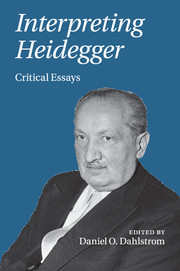Book contents
- Frontmatter
- Contents
- List of contributors
- Acknowledgments
- Method of citation and bibliography of Heidegger's works
- Introduction
- I Interpreting Heidegger's Philosophy
- 1 Heidegger's hermeneutics: towards a new practice of understanding
- 2 Facticity and Ereignis
- 3 The null basis-being of a nullity, or between two nothings: Heidegger's uncanniness
- 4 Heidegger's concept of freedom, 1927–1930
- 5 Ontotheology
- II INTERPRETING HEIDEGGER'S INTERPRETATIONS
- III INTERPRETING HEIDEGGER'S CRITICS
- Index
- References
4 - Heidegger's concept of freedom, 1927–1930
Published online by Cambridge University Press: 11 April 2011
- Frontmatter
- Contents
- List of contributors
- Acknowledgments
- Method of citation and bibliography of Heidegger's works
- Introduction
- I Interpreting Heidegger's Philosophy
- 1 Heidegger's hermeneutics: towards a new practice of understanding
- 2 Facticity and Ereignis
- 3 The null basis-being of a nullity, or between two nothings: Heidegger's uncanniness
- 4 Heidegger's concept of freedom, 1927–1930
- 5 Ontotheology
- II INTERPRETING HEIDEGGER'S INTERPRETATIONS
- III INTERPRETING HEIDEGGER'S CRITICS
- Index
- References
Summary
The concept of freedom plays an important role in Being and Time and takes on an increasingly important place in Heidegger's essays and lectures of the post-Being and Time 1920s and early 1930s. In his lecture course of 1928/29, Introduction to Philosophy, he speaks of freedom as the “innermost essence of [human] existence” (GA 27: 103). An entire lecture course devoted to the concept of freedom in 1930 (The Essence of Human Freedom: An Introduction to Philosophy) begins with the claim that the question of the essence of human freedom “lays the whole of philosophy before us.” The essays written during this period make even stronger claims for freedom. According to “On the Essence of Ground,” written in 1928 immediately after the publication of Being and Time, “Freedom alone can let a world prevail and let it world for Dasein” (Wegm 162/Pathm 126). And in “On the Essence of Truth,” written in 1930 and revised over the years, the discussion of “the essence of truth” is introduced by way of a section entitled “The Essence of Freedom” (Wegm 185–189/Pathm 143–147). It is here that we find the nearly inscrutable statement that the essence of truth is freedom.
The concept of freedom is also central to Being and Time. In some cases, when Heidegger talks about freedom, we seem to be on familiar ground.
- Type
- Chapter
- Information
- Interpreting HeideggerCritical Essays, pp. 79 - 105Publisher: Cambridge University PressPrint publication year: 2011
References
- 10
- Cited by

